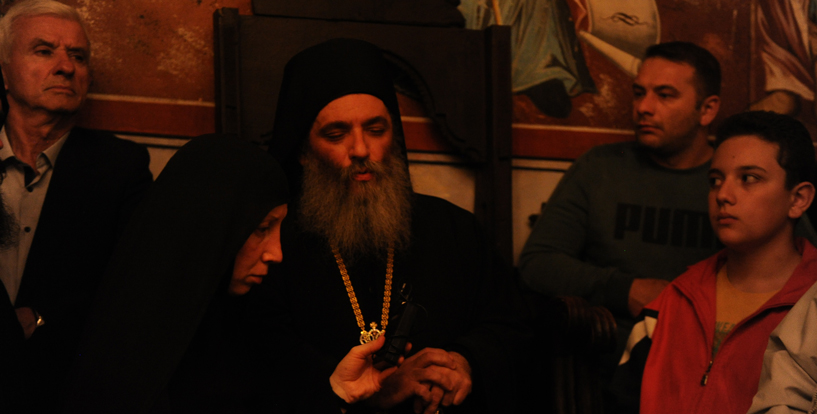Sermon of His Beatitude, Archimandrite Parthenius, uttered during the Vespers on the Exaltation of the Holy Cross in St. George Convent in Rajchica

Welcome my dear ones, to this festive Vespers Service! May the power of the Holy Cross protect all of you and all your neighbors.
In a well known ecclesiastic verse, which always comes after the Sunday Gospel reading, we proclaim: Behold, through the Cross joy came to the entire world. But what kind of joy? Certainly not the vain, worldly one. It’s the joy which comes through suffering. Let us look at the presentation of the Holy Crucifixion. What can we see? The merciful Christ crucified, in compassion with the whole world, carrying upon Himself the pain of the entire human kind, embracing the universe with his hands wide open, sympathizing with the pain of all creation. That’s what the message of the Cross of our Lord is, the Exaltation of which we celebrate today. Compassion with the whole world, divine sympathy towards man. Such is the divine message to us from today’s holiday, when the priests everywhere in the Orthodox churches raise the Holy Cross before our eyes – a message of love towards the neighbor, compassion towards our co-citizen. Why? What is it that touches our heart when we see the Cross exalted before us? It is the love that our Lord has shown us. Every time when I venerate the Cross of our Lord, I feel a certain pain, something that touches me, makes me consider. The Love of God. Because it was there, right there on the Cross, where the love of God shone more brightly than ever – where He attained the greatest glory. Going to His voluntary crucifixion, He told the Apostles: The hour is come, that the Son of man should be glorified (John 12, 23). Do you see? He was glorified through His suffering. That is the eternal message of the Cross: through suffering to eternal glory. Therefore we should never leave the cross, i.e. all the temptation and the suffering which have been given to us in this life, of course for our own good and humbleness. We should patiently and gratefully carry our cross, having before our eyes the testimony that the life of a Christian is envisioned in the light of the Cross and Resurrection. If through the Cross Christ brought joy to the whole world; if through His suffering He reached the salvation for all of us, then inevitably after the sufferings and troubles that we humbly endure every day, in the end joy would certainly come. Therefore we define our life as simultaneous cross and resurrection. After the crucifixion comes the new life and resurrection.
Our forefather Adam interrupted his union with God because of disobedience. Christ, The New Adam, out of obedience to His Father, humbled himself, and became obedient unto death, even the death of the cross (Philip. 2, 8) and through the Cross saved the whole world. For that reason, I beseech you, let us always remind ourselves just how important the obedience and humbleness are to God. He invites us to obedience towards Him: Learn of me; for I am meek and lowly in heart: and ye shall find rest unto your souls (Mathew 11, 29) and commands us to love all people. To humble ourselves in our suffering, but also to sympathize with the others in their troubles. As the Apostle Paul said, addressing the Christians of Corinth: I am made all things to all men, that I might by all means save some (I Corinth. 9, 22). With the sad ones I cried, with the joyful I rejoiced. Only the one who sympathizes with his brother, with his neighbor, can really be called a Christian.
The one who humbly carries his cross and loves the entire creation of God, having as an example the love of God for His creation; who doesn’t make a difference classifying people to such and such, to faithful and infidels, to Judeans and Hellenic, to different nations, social groups, social status… The Son of God and the Son of Man cried this from the Cross, referring even to those who crucified Him: Father, forgive them; for they know not what they do (Luke 23, 34). He prayed for them! That’s how we, my dear Christians, should pray for the whole world, because having with us the truth of Christ, we have also the greatest responsibility for everybody and everything.
Let us not forget, therefore, the compassionate love towards every human being in this world and towards the entire creation of God. And this, I must say, is something very rare today.
This evening, the contemplation of this wonderful divine service, as well as all the events in the Orthodoxy today, made me want to talk precisely about that – the sympathizing of our Lord with just about every one of us. The fact that He had shown ultimate love towards us, and yet, we who call ourselves Christians, are so far away, unfortunately, from His Divine love. We want to be Christians, take pride in this holy name, love to decorate ourselves with the cross, to go to church, but still, our lips and thoughts, instead of Christian compassion, love, and forgiveness, utter words of condemnation. I see people incompetent and with insufficient knowledge of the ecclesiastic teaching, dare so easily to condemn priests, monks, Bishops, even patriarchs, and what is worse and inadmissible – criticize and condemn Council decisions. This goes especially for the decisions of the last Pan-Orthodox Council on Crete! Maybe never before in history there had been such extent of condemnation as it is present today. Only an insolent man, who has lost all kind of ecclesiastic conscience and unity with Christ, could spread such slander and accusations. The Christian, however, who lives in the light of the Cross and resurrection, doesn’t raise proudly his head condemning others, but being aware of his own sins, humbles himself and thus learns the real value of catholical life in the Church. Within himself he sees the action of the old man in Adam who decays in his wrong desires, and battles with him every day. If we but pay closer attention to ourselves, we would easily see that very often we give more space to the egoism in us, than to Christ. And still we are invited to inhabit Christ in us, through crucifying our own ego and passions and sins, so that we could freely say, along with the Divine Paul: Not I, but Christ liveth in me (Galatians 2, 20). If we truly become such Christians, then joy would inevitably come to us and to those around us. Actually, according to the Christian logics, it’s much more important that those around us should feel better than us, we come second to them. Then we could with pure heart and conscience exclaim as the ecclesiastic poet: Behold, through the Cross joy came to the entire world.
May you all be well and may the Cross of God protect us all! Amen!















